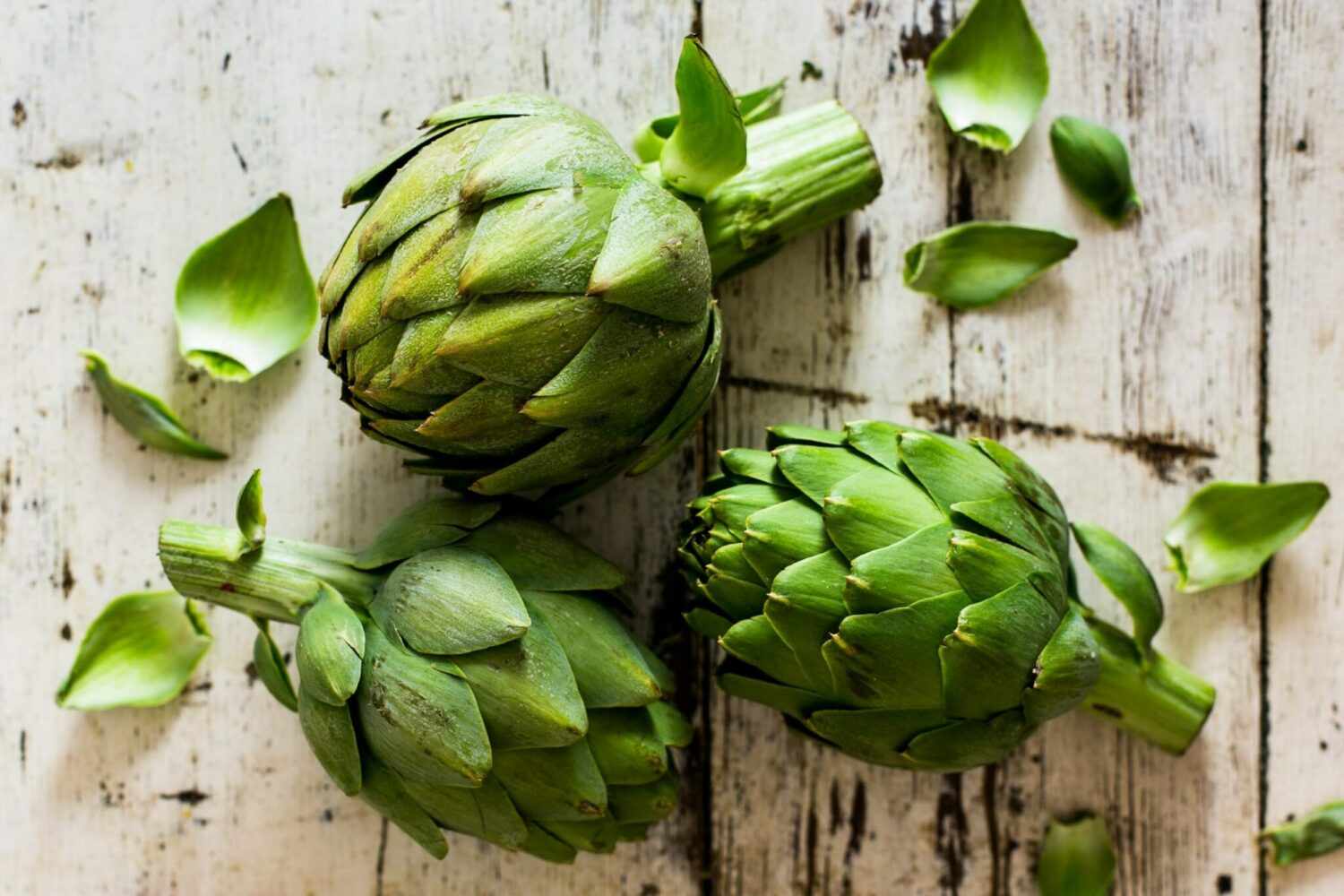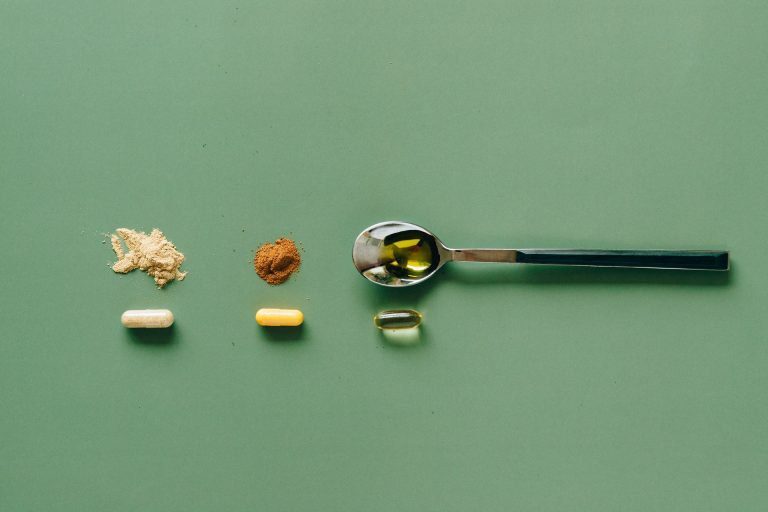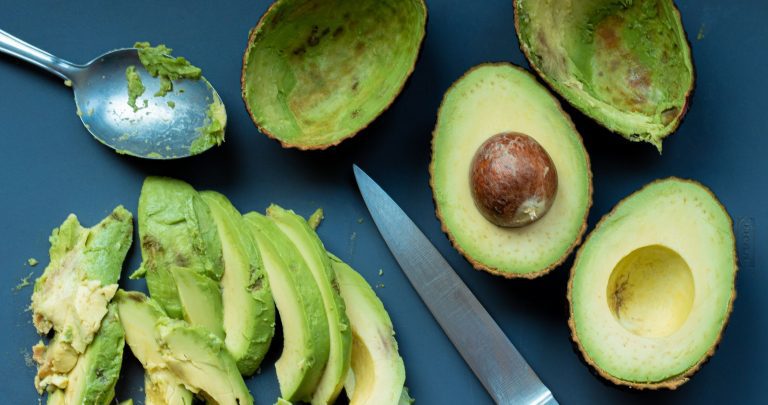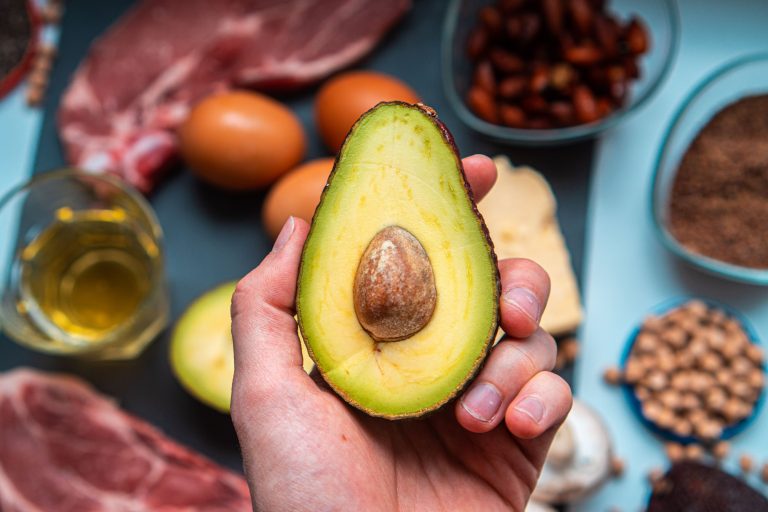Artichoke Detox: 11 Benefits on Brain, Skin & Heart Health
Artichoke is a super healthy edible vegetable with a long history of use for its liver detox, cholesterol-lowering, and digestion-supporting properties. Artichokes can be eaten boiled, steamed, grilled, or roasted but its benefits can also be enjoyed with the intake of Artichoke Leaf extract which has higher concentrations of many beneficial bioactive compounds. Artichoke detox everyone, let’s get in.
What is Artichoke?
A powerful green plant loaded with essential minerals and bioactive compounds.
Artichoke has a long history of use, dating back to the 8th century in Ancient Greece, used for many of its detoxifying and anti-inflammatory properties. Artichoke belongs to thistle special in the Cynara genus and Asteraceae family
The bud consists of bracts or “hearts” and immature florets referred to as “choke”. Artichoke’s name origin is complex, dating back to the 16th century, from the word articiocco which in Italian is carciofo. Ciocco means stump, so probably this plant got its name from its structure.
The artichoke heart is the edible part of it, known as the bud. It is edible before the flowers start to blood. The fuzzy part known as the “choke” is not edible.
Artichoke leaves are also edible but they have to be peeled and cooked to avoid side effects, so do not consume them in their raw form. Most of the Artichoke extract supplements on the market, make the tincture with extraction from the leaf itself.
In Vietnam, Artichoke is also enjoyed as herbal tea. Grinding the leaves into a fine powder and mixing it in a cup of hot water, brings forth the woody, bitter and earthy taste along with many potential benefits.
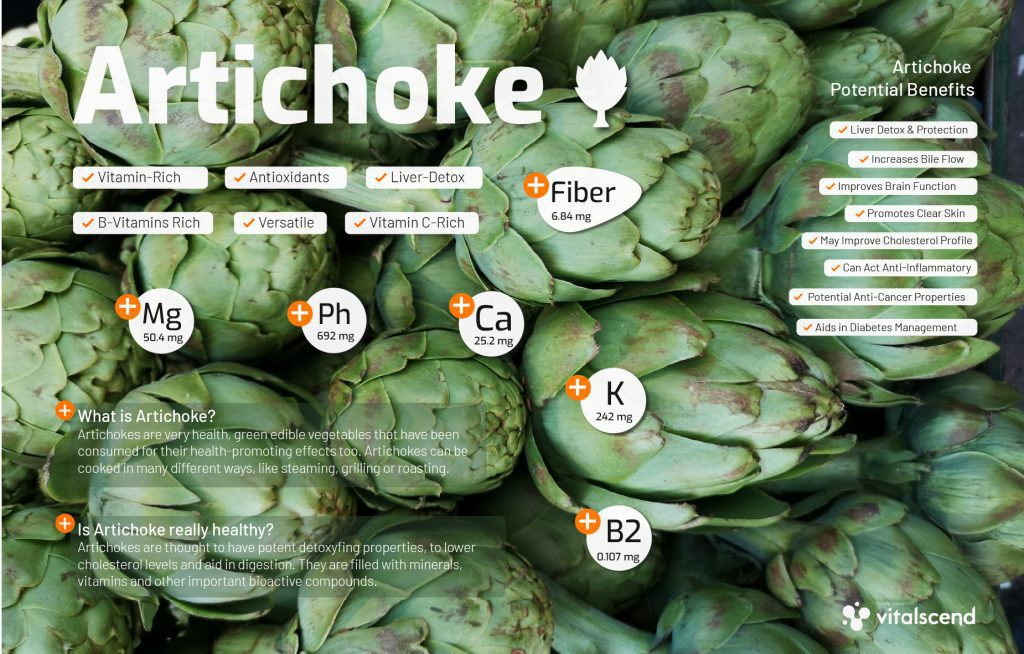
Artichoke Nutrition: Vitamins and Minerals
Artichoke offers a pretty clean, low-fat, and high-fiber profile, which can help with diabetes, bowel movement, and accelerate weight loss.
The nutritional profile of one medium Artichoke which weighs around 120 grams or 4.23 ounces contains:
| Vitamins | Minerals |
| Thiamine B1: 0.06 mg | Magnesium: 50.4 mg |
| Riboflavin B2: 0.107 mg | Calcium: 25.2 mg |
| Niacin B3: 1.33 mg | Phosphorus: 87.6 mg |
| Vitamin C: 8.88 mg | Potassium: 242 mg |
| Vitamin K: 17.8 µg | Zinc: 0.48 mg |
| Vitamin B6: 0.097 mg | Copper: 0.152 m |
| Folate: 107 µg | Sodium: 355 mg |
This vitamin and mineral profile shows that Artichoke offers a variety of essential nutrients that are beneficial for our bodies. This plant is not rich in all of these nutrients, but higher amounts of vitamin C, vitamin K, vitamin B6, Folate (B9), Magnesium, and Potassium are present.
The real magic of Artichoke lies in its bioactive compounds. Some of its unique compounds can improve many functions in the body related to overall health. Artichoke is rich in polyphenolic compounds that have important antioxidant properties. (1) (2)
| Chlorogenic Acid | Phenolic acids |
| Luteolin | Caffeoylquinic acids |
| Epigenin | Caffeic acid |
| Cynarin | Flavonoids |
Antioxidant activity was associated with the content of polyphenolic compounds, the higher they were, the better the antioxidant performance artichoke possessed.
It was shown that most phenolic compounds are present in the leaves of the artichoke, rather than the head. This examination suggests potential uses of artichokes for the pharmaceutical industry.
Health Benefits of Artichoke
1. Aids in Liver Protection and Detox
This plant has liver-detoxifying properties, mostly because of the active ingredients it contains.
There are four main underlying mechanisms of Artichoke’s liver-supportive effects: (3)
- Stimulation of bile in the Liver
- Hepatoprotective (antioxidant) properties
- Hypocholesterolemic (cholesterol-lowering) properties
- Antihepatotoxic (Liver detoxifying) properties
In fact, Luteolin and Quercetin can reduce high blood cholesterol levels, through the inhibition of intestinal cholesterol absorption. (4)
Increased Bile Flow
Besides this cholesterol-lowering effect, Artichoke has been found to increase bile flow in the liver. This is a fluid produced by the liver, crucial for breaking down fats and fat-soluble vitamin absorption.
The artichoke was found to significantly increase bile flow in the liver, in Wistar rats at dosages of 400 mg/kg, after both single and repeated administration. (5)
Liver protection
Liquid extracts made from Artichoke roots and leaves helped with liver support, protection, and even liver cell regeneration in animal studies. Research data supports artichoke hepatoprotective and cholesterol-lowering effects. (6)
- Artichokes may protect your liver due to their hepatoprotective properties. It contains Luteolin – which may lower cholesterol and inhibit cholesterol biosynthesis. (7)
- Polyphenolic acids and flavonoids in Artichokes possess strong antioxidant properties which were shown to enhance liver health and reduce the level of liver enzymes associated with liver damage, such as ALT and AST. (8)
Cholesterol-lowering effect
The Liquid extracts made from Artichoke roots and leaves may help with liver support, protection, and even liver cell regeneration. Research data supports artichoke hepatoprotective and cholesterol-lowering effects. (9)
Artichoke may exert synergistic effects along with lipid-lowering therapy, which can assist in the reduction of LDL cholesterol and triglyceride levels. (10)
summary
Research supports Artichoke’s liver protective, supportive, and detoxifying effects. The main mechanism behind those effects lies in lowering cholesterol, reducing oxidative stress, and increasing bile flow in the liver.
2. May Reduce Blood Pressure
As a great source of potassium, artichokes can help in the regulation of blood pressure, since potassium plays a major role in blood pressure control. They affect fluid balance by combating the water retention effect of sodium.
Blood pressure, as one of the risk factors for cardiovascular diseases, can be managed with potassium. In this hypertension management report, it is suggested that increasing potassium intake up to 4.7 grams a day can predict lower cardiovascular disease. (11)
- Artichoke Leaf Juice given to patients with mild hypertension, at dosages of 50-100mg (juice), was shown to reduce blood pressure. (12)
- Artichoke flavonoids were shown to increase endothelial-type nitric oxide synthase also known as eNOS – which may improve blood flow and have an anti-sclerotic effect. (13)
Flavonoids are secondary metabolites in plants that have many functions such as regulation of plant development, UV protection, and inflammation-reducing properties.
It means it enhances blood flow, and opens up (exhibits vasodilatory effect) the blood vessels so it can reduce blood pressure and enable more oxygen to travel through.
summary
Artichoke contains flavonoids which can improve blood flow, therefore reducing blood pressure. It is also rich in potassium, which manages to regulate blood pressure, especially hypertension, which is related to excessive sodium consumption.
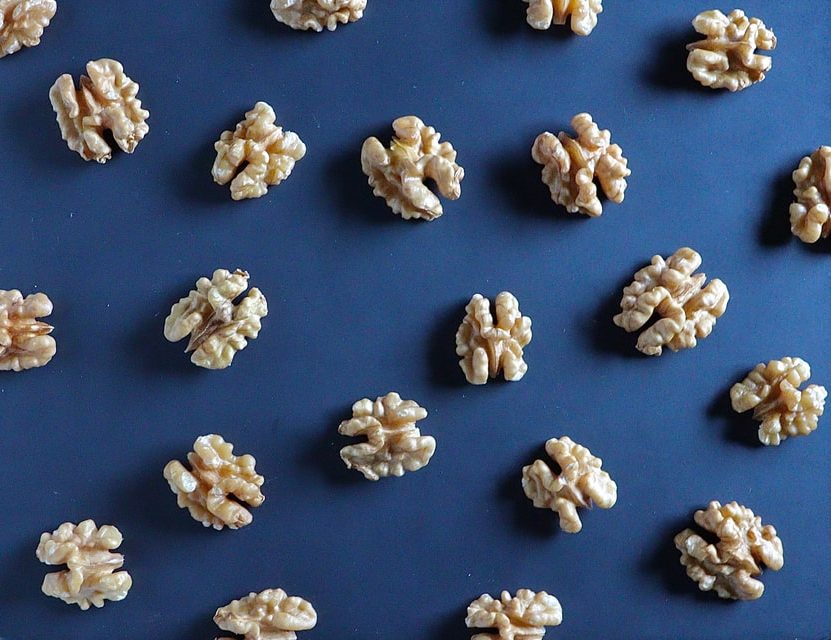
3. May Improve Brain Function
This plant is also a great nootropic alternative, which can improve blood flow in the brain. This may aid in improved brain function and performance and positively affect memory, cognition, and learning.
Artichoke has been one of the major ingredients in many natural nootropic or brain-enhancing supplements, used in combination with Rhodiola, Alpha GPC, Acetyl L-Carnitine, Ginkgo Biloba, and Choline.
Many of its brain-enhancing effects are present because Artichoke is such a powerful vasodilator. Opening up blood vessels in the brain can allow more oxygen to reach the brain, which can improve cognition.
- Artichoke can inhibit cAMP degradation, which plays role in brain cell signaling and produces proteins for synapse growth. (14)
- cAMP is an adenosine triphosphate (ATP) derivative, which plays a major role in energy production.
- One of the mechanisms behind this is re-establishing redox homeostasis, which means a balance between oxidants and nucleophiles. When oxidative stress damage is present, this alters the redox state. (15)
This plant is also a powerful antioxidant, which may reduce inflammation in the brain and decrease excessive cytokine content in the brain, which can prevent memory loss.
summary
Artichokes may improve brain function due to their antioxidant and vasodilatory effects. It can inhibit cAMP degradation, resulting in more energy for the brain.
4. Promotes Clear Skin
Artichoke is a pretty powerful skin cleanser, that makes it look fresh, vital, and young.
Being rich in Antioxidants such as caffeic and ferulic acid can reduce inflammation in the skin which will slow down aging and eliminate blemishes and wrinkles.
- Artichoke contains bioactive compounds like Quercetin and Kaempferol, which are very powerful antioxidants that can produce antioxidant-like effects on the skin and support healthy skin function and reduce UV damage. (16)
- Many of Artichoke’s bioactive compounds like polyphenols have potential anti-aging skin effects. Through improving endothelial cell integrity and functionality, artichoke extract was found to enhance skin roughness by 19.74% and elasticity by 11.45% in comparison to the placebo group. (17)
One medium-sized Artichoke provides around 20-30% RDI of Vitamin C, which makes it rich in one f the most potent skin-supportive vitamins. (18)
Vitamin C is another compound found in Artichoke, that has a strong antioxidant effect on the skin, and it also supports collagen production. Collagen makes skin look youthful and healthy, improves elasticity, and provides structure and strength to the skin.
Artichokes also contains Cynaropicrin which can suppress UV-induced damage on the skin, which slows down skin aging. The mechanism behind this is inhibiting transcription activity of the NF –kB pathway. (19)
summary
Polyphenolic compounds in Artichoke can make your skin look fresh, vital, young, and healthy due to its anti-inflammatory effects. Vitamin C can aid in collagen production which improves skin cell structure, integrity, and elasticity. Cynaropicrin found in artichoke can protect UV damage on the skin.
5. Improves Digestion
Just looking at the nutritional profile of this plant, you can tell it aids in digestion.
Artichoke is a low-calorie, high-fiber option. It can improve bowel movements, prevent constipation, and also improve the digestion of important nutrients.
Prevents constipation, Increases Bowel Movement
In the gut, artichokes can improve gut flora lining or microbiome, the living “good” bacteria inside, since they contain prebiotics which serve as a fuel to those probiotics, the real bacteria.
In this study, twenty patients were given 180 grams of both artichokes and probiotic-enriched artichokes for 15 days. Probiotic-enriched artichokes have significantly reduced constipation symptoms and participants preferred probiotic enriched, rather than regular ones. (20)
Extra Research: Artichoke on Digestion
- Artichoke leaf extract may also help with alleviating symptoms of irritable bowel syndrome or IBS. As shown in this study, a significant 26.4% reduction in IBS incidence after artichoke treatment, in healthy volunteers suffering from concomitant dyspepsia. (21)
- Another study on IBS proved that Artichoke can be a potential agent in treating digestion problems, due to the fact it reduced many IBS-related symptoms. 96% of the patients rated Artichoke leaf extract as good or equal to previous therapies, plus it was well tolerated. (22)
- A combination of ginger and artichoke leaf extract was investigated for its effects on digestion in 126 subjects with functional dyspepsia. It turned out that there was a great association between taking the supplement and improved scores for nausea, epigastric fullness, and bloating. (23)
summary
Being a high-fiber and prebiotic-rich option, Artichoke can support digestion and feed the healthy bacteria in the gut. Artichoke extract was found to alleviate many gut-related symptoms such as gas, abdominal cramps, nausea, and constipation problems.

6. May Improve Heart Health
In terms of cardiovascular health, both benefits mentioned before, such as cholesterol-lowering effects and blood pressure reduction is the reason behind its heart-friendly properties.
As a natural alternative that can have synergistic effects with another lipid-lowering drug, Artichoke performed great in reducing total cholesterol, triglyceride, and LDL levels. (24)
- Artichokes may exert a vasodilatory effect, which has anti-thrombotic and anti-atherosclerotic effects. (25)
- Artichoke is also capable of reducing plaque build-up in the arteries.
- It may reduce MMP-9 – which is associated with heart disease and plays role in plaque accumulation. (26)
summary
Artichoke can be good for the heart, reduces inflammation, reduces plaque build-up, and opens up blood vessels which further improves circulation and has a positive effect on overall cardiovascular health.
7. Has Potential Anti-Cancer properties
A unique set of antioxidants found in Artichokes may play a role in preventing cancer growth. (27) (28)
Antioxidant effects of Artichoke or any other plants may not stop or prevent cancer but are definitely healthy in supporting your body to fight against tumor or cancer cell growth.
Artichoke contains Vitamin C, polyphenols, rutin, and quercetin. Polyphenols are known for their chemopreventive properties while Rutin and Quercetin as antioxidants, which might reduce the risk of developing cancer. (29)
- Artichoke was also found to inhibit tumor growth in malignant pleural mesothelioma. (30)
- Many polyphenolic extracts from artichoke’s edible parts are known to have potential chemopreventive and anticancer properties. Higher doses of these extracts were found to induce apoptosis and decrease cancer growth in human breast cancer cells. (31)
summary
Artichoke is rich in many phenolic compounds that can fight inflammation and may reduce the risk of cancer. This plant is also rich in other antioxidants and bioactive compounds such as quercetin, vitamin C, and rutin, which may have chemoprotective properties.
8. Aids in Diabetes Management
In people who have trouble with blood sugar levels, whether it is overeating or insulin-related problems, high-fiber and low-sugar foods are a great alternative. This is why eating leafy green vegetables is often recommended along with whole grains.
Both soluble and insoluble fiber can be a great addition that helps with the prevention or treatment of diabetes. Soluble fiber can slow sugar absorption, which helps in blood sugar level stabilization. On the other hand, insoluble fiber may reduce the risk of developing type 2 diabetes.
Artichoke is rich in both soluble and insoluble fiber, which can help stabilize blood sugar levels and stimulate digestion. Fructans are found in Artichokes and they represent a large fructose molecule. Fructans can help with blood sugar regulation.
Inulin, which is one of the most popular fructans is associated with reduced hunger levels and a preference for sweet or salty foods.
In this review on 1346 prediabetic and diabetic (type 2) patients, Inulin-type fructans supplementation improved glycemic control. Inulin-type fructans supplementation led to reduced fasting blood glucose, glycosylated hemoglobin, fasting insulin, and insulin-resistance model. (32)
summary
Fructans found in Artichoke may help to control blood sugar levels. Artichoke is high in fiber which aids digestion, promotes satiety, and reduces cravings for sugary foods.
Artichoke Recipes
Seafood Artichoke Special | Steamed
Green Cheesy Salad | Roasted
Vegan Bowl Special | Grilled
Steaming: Put the artichoke above boiling water for 20-40 minutes (Steam it)
Cutting: Cut Artichokes pedals into smaller pieces and add them to your next sauce
Sauce: Mix onion, garlic, and leek and fry them in organic butter (5 minutes)
Seafood: Fry the seafood mixture in butter (time depends on the product)
Mixing: Mix the artichoke pedals, sauce, and seafood in a big pan and add salt, garlic, and lemon juice
Cutting: After you washed, removed all the spikes and stem, cut your artichoke in half
Seasoning: Rub a lemon on top, brush some olive oil and add oregano and black pepper on top
Roast: put it on a baking sheet and roast it in 350 degrees oven for 40-60 minutes.
Salad: Cut the desired amount of Kale, Spinach and add one whole avocado with tsp of flax seeds.
Sauce: fry some finely cut onion and garlic, add some sour cream and salt, mix it.
Adding: Cut the artichoke into small pieces and mix it into the salad, add the sauce with some extra olive oil and black pepper, Enjoy.
Cutting: Clean the baby artichokes and take the leaves off, cut them in half, rub some lemon on top
Grill: grill the baby artichokes until tender, take them off to cool them down
Salad: Mix some Spinach, Avocado, chickpeas, and corn into a bowl
Mixing: Add the baby artichokes to the salad and add Honey Mustard sauce, Enjoy
Artichoke Uses, Safety, Side Effects, Precautions, Drug Interaction, and Dosage
Artichoke has been used for a variety of reasons, mostly because of its nutrient-dense profile which offers many health-related benefits.
Researchers have enough evidence to back up the uses of Artichoke and its effectiveness in improving digestion (treating indigestion) and reducing cholesterol levels, both total and LDL.
There are also uses of artichoke for whom there is not enough research data to back up and guarantee its effectiveness.
Uses
Safety / Side Effects
Dosage
Precautions
Potential benefits but Insufficient evidence of Artichoke use is in Hepatitis C, Anemia, IBS, high blood pressure, Arthritis, Diabetes, Liver problems, Gallstone prevention, and snakebites.
In regards to safety, artichoke is possibly safe taken by mouth. If you choose supplements be cautious and look for a tested and FDA-approved one, and of course, consult with your doctor before using it and use it in a responsible dose-dependent manner.
Some Side effects that have been reported of Artichokes use are allergic reactions, gas, abdominal cramps, diarrhea, and upset stomach.
Dosage: Usually artichoke is used at doses of 320-640 mg of artichoke leaf extract, but make sure you always follow your doctors recommendations, for your specific need.
Special precaution on Artichoke usage: Artichoke has not been well studied and should be avoided by pregnancy/breastfeeding women, gallstone, bile duct obstruction patients, and people with allergies to raw weed and similar plants.
conclusion
Artichoke is a healthy vegetable with a long history of use. It is packed with nutrients, vitamins, minerals, and fiber. A great veggie that supports digestion due to its fiber-rich profile. Artichokes can be eaten boiled, steamed, grilled, or roasted. For maximal benefits, there are artichoke extract supplements that have a higher dose of its bioactive compounds. It has potential benefits in liver detox, brain function, heart health, and skin regeneration.

